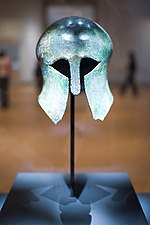Sohn Kee-chung
 | ||
| Medal record | ||
|---|---|---|
| Men's athletics | ||
| Representing | ||
| Olympic Games | ||
| 1936 Berlin | Marathon | |
| Sohn Kee-chung | |
| Hangul | 손기정 |
|---|---|
| Hanja | |
| Revised Romanization | Son Gijeong |
| McCune–Reischauer | Son Kijŏng |
| Japanese name: error: {{nihongo}}: Japanese or romaji text required (help) | |
Sohn Kee-Chung (Korean: 손기정)(August 29, 1914[1] – November 15, 2002) became the first medal-winning Korean Olympian, when he won the gold medal in the marathon at the 1936 Berlin Olympics as a member of the Japanese delegation.
He competed under the Japanese name Son Kitei, because Korea was part of the Japanese Empire. The name is based on the Japanese Kanji pronunciation of his Korean name.
Early life
Sohn was born in Sinŭiju, North P'yŏngan Province, Korea, Sohn Kee-Chung was educated at Yangjeong High School (양정고등학교) in Seoul, Korea and Meiji University in Japan, from which he graduated in 1940.
Athletics career
Between 1933 and 1936, he ran 13 marathons and won 10 of them. On November 3, 1935 in Tokyo, Japan, Sohn Kee-Chung set a world best in the marathon with a time of 2h26:42.[2][3] According to the International Association of Athletics Federations, this record remained unbroken until Sohn's own trainee, Suh Yun-Bok, won the 1947 Boston marathon.[2][4]
On April 25, 1935, Sohn set a personal best of 2h25:14 that is presumed to have been short.[1]
1936 Berlin Olympics
Sohn, who was competing for the Empire of Japan, won the gold medal at the 1936 Summer Olympics in the marathon. He ran the 42.195 kilometres (26.219 mi) course in 2h29:19.2, breaking the olympic record. His Korean teammate Nam Sung-yong took the bronze medal. Despite both being Koreans, Japan is still officially credited with Sohn's gold and Nam's bronze in the 1936 Summer Olympics medal count.
Political significance
Under orders from Tokyo, Sohn Kee-Chung had to compete using the name of Son Kitei because this was the Japanese pronunciation of 孫基禎, his Korean name.[6] But as a nationalist, Sohn refused to sign his name in Hanja, and instead wrote it in Korean; he even sketched the shape of Korean flag beside some of his signatures. When interviewed about his country, he would clarify that it was Korea and not Japan.
When the Dong-a Ilbo, published a photograph of Sohn at the medal ceremony it altered the image to remove the Japanese flag from his running tunic. The act enraged the Governor-General of Korea in Seoul. The military police imprisoned eight people connected with the newspaper and suspended its publication for nine months.
Hellenic prize

For winning the marathon, Sohn was to have received an ancient Greek Helmet (circa BCE 800-700) that had been discovered at Olympia, Greece by German archaeologist Ernst Curtius in 1875. But the presentation of the prize was blocked by Sohn's Japanese coaches.
Instead the helmet was placed in a Berlin museum where it remained for fifty years. After the intervention of a Greek newspaper, the helmet was finally presented to Sohn in 1986. On March 7, 1987, the helmet was categorised as the 904th Korean national treasure. Replicas of this helmet were awarded to the winners of the 2006 Sohn Kee-Chung half and full marathon.
Later life
Sohn spent the remainder of his career in South Korea coaching other notable runners such as:
- Suh Yun-Bok, the winner of the Boston Marathon in 1947
- Ham Kee-Yong, winner of the Boston Marathon in 1950
- Hwang Young-Cho, who was the gold medalist of the 1992 Summer Olympics marathon, and whom Sohn Kee-Chung especially went to Barcelona to see
Sohn became the Chairman of the Korean Sporting Association. At the 1988 South Korean Olympics, Sohn was given the honor of carrying the Olympic torch into the stadium at the opening ceremony. [7]
He authored an autobiography entitled My Motherland and Marathon (나의조국과 마라톤).
He was honoured with the Korean Order of Civil Merit (Hangul:국민훈장).
Death and legacy
Sohn Kee-Chung died at midnight on November 15, 2002 from pneumonia. He was buried at the Daejeon National Cemetery. The Sohn Kee-Chung Memorial Park in Seoul was established in his honor. [7] He was also posthumously made a Grand Cordon (Blue Dragon) of the Order of Sport Merit.
See also
References
- ^ a b "World Marathon Rankings for 1935". Association of Road Racing Statisticians. September 20, 2009. Retrieved November 15, 2010.
- ^ a b "12th IAAF World Championships In Athletics: IAAF Statistics Handbook. Berlin 2009" (pdf). Monte Carlo: IAAF Media & Public Relations Department. 2009. pp. Pages 565. Retrieved July 29, 2009.
- ^ http://www.marathonguide.com/history/records/popupSummary.cfm?RID=MMAR19350331#MMAR19350331
- ^ Shu Yun-Bok's performance was set on a course considered to be short by some road racing authorities, which means Sohn's world best may have truly lasted until the early 1950s. (See the Association of Road Racing Statistician's web pages regarding the Boston Marathon and World Best Progressions.)
- ^ "Sohn Kee-chung". The Guardian. London. November 30, 2002. Retrieved May 23, 2010.
- ^ http://en.beijing2008.cn/spirit/pastgames/halloffame/s/n214046800.shtml
- ^ a b "Sohn Kee-chung". Korea Times. Retrieved 2010-11-04.
{{cite web}}: Italic or bold markup not allowed in:|publisher=(help)
External links
- 1914 births
- 2002 deaths
- Athletes (track and field) at the 1936 Summer Olympics
- Former world record holders in athletics (track and field)
- Korean athletes
- Korea under Japanese rule
- Korea University alumni
- Long-distance runners
- Olympic athletes of Japan
- Olympic gold medalists for Japan
- Olympic medalists in athletics (track and field)
- People from Sinuiju
